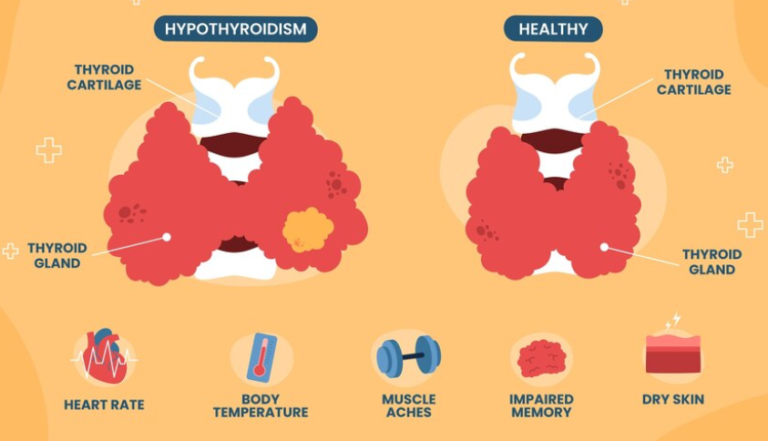Introduction
When it comes to weight loss, hormones play a crucial role that many people often overlook. One hormone that has a surprising impact on weight management is Thyroid Stimulating Hormone (TSH). Understanding the connection between TSH and weight loss can unlock new strategies for achieving your health goals.
Table of Contents
What is Thyroid Stimulating Hormone (TSH)?
Definition and Function
Thyroid Stimulating Hormone (TSH) is a pituitary hormone that regulates the function of the thyroid gland. It stimulates the thyroid to produce two key hormones: thyroxine (T4) and triiodothyronine (T3). These hormones are vital for regulating metabolism, energy production, and overall cellular function.
How TSH is Produced
TSH is created in the pituitary organ, a little pea-sized gland situated at the base of the brain. The production of TSH is regulated by the hypothalamus, which releases Thyrotropin-Releasing Hormone (TRH) to stimulate the pituitary gland.
The Role of the Thyroid Gland
Overview of Thyroid Gland Function
The thyroid gland, located in the neck, is responsible for creating hormones that regulate metabolism, heart rate, and body temperature. It plays a critical role in maintaining the body’s metabolic balance.
Interaction Between TSH and Thyroid Hormones
TSH binds to receptors on the thyroid gland, prompting it to release T4 and T3. These hormones then feedback to the pituitary gland to regulate the production of TSH, maintaining a delicate balance essential for metabolic health.
How TSH Affects Metabolism
TSH and Metabolic Rate
TSH influences the metabolic rate by controlling the levels of T3 and T4. High levels of these thyroid hormones boost metabolism, while low levels slow it down.
Influence of TSH on Calorie Burning
By regulating thyroid hormones, TSH indirectly affects how efficiently the body burns calories. Optimal TSH levels ensure that the body burns calories at a healthy rate, aiding in weight management.

TSH and Weight Loss: The Surprising Connection
How TSH Levels Impact Weight
Research shows a clear connection between TSH levels and body weight. Abnormal TSH levels can lead to either weight gain or weight loss, depending on whether the levels are high or low.
Research Findings on TSH and Weight Loss
Studies indicate that individuals with slightly elevated TSH levels tend to gain weight, while those with lower TSH levels might experience weight loss. This relationship highlights the importance of maintaining balanced TSH levels for effective weight management.
High TSH Levels and Weight Gain
Causes of Elevated TSH Levels
High TSH levels typically indicate an underactive thyroid (hypothyroidism). This condition can be caused by autoimmune diseases like Hashimoto’s thyroiditis, certain medications, or iodine deficiency.
Symptoms and Effects on Weight
Symptoms of high TSH levels include fatigue, cold intolerance, and weight gain. The slower metabolic rate associated with high TSH makes it challenging to lose weight.

Low TSH Levels and Weight Loss
Causes of Low TSH Levels
Low TSH levels are often a sign of an overactive thyroid (hyperthyroidism). Causes can include Graves’ disease, thyroid nodules, or excessive intake of thyroid hormone medication.
Symptoms and Effects on Weight
Low TSH levels increase metabolism, leading to symptoms like rapid heartbeat, anxiety, and unintended weight loss. The body burns calories faster than usual, making weight maintenance difficult.
Balancing TSH for Effective Weight Management
Strategies to Maintain Healthy TSH Levels
Maintaining balanced TSH levels is crucial for weight management. Regular check-ups with a healthcare provider, appropriate medication, and lifestyle changes are essential strategies.
Diet and Lifestyle Tips
A balanced diet rich in nutrients that support thyroid health, combined with regular physical activity, can help manage TSH levels. Stress management techniques such as meditation and yoga can also play a significant role.
Dietary Influences on TSH and Weight
Foods That Support Thyroid Health
Foods rich in iodine, selenium, and zinc support thyroid health. Seaweed, fish, dairy products, nuts, and seeds are excellent choices.
Nutrients Essential for TSH Balance
Key nutrients for TSH balance include iodine, selenium, and vitamins B and D. These nutrients aid in the production and regulation of thyroid hormones.
Lifestyle Factors Affecting TSH and Weight
Importance of Physical Activity
Regular exercise boosts metabolism and supports healthy thyroid function. Activities like walking, swimming, and strength training are particularly beneficial.
Stress Management Techniques
Chronic stress can disrupt thyroid function. Techniques such as mindfulness, deep breathing exercises, and adequate sleep help manage stress levels and maintain thyroid health.

Medical Interventions for TSH Imbalance
When to See a Doctor
If you experience symptoms of thyroid dysfunction, such as unexplained weight changes, fatigue, or mood swings, it’s essential to see a healthcare provider. Regular blood tests can monitor TSH levels.
Treatments for High and Low TSH Levels
Treatment for TSH imbalance may include thyroid hormone replacement for hypothyroidism or antithyroid medications for hyperthyroidism. In some cases, surgery or radioactive iodine treatment may be necessary.
Common Myths About TSH and Weight Loss
Debunking Popular Misconceptions
One common myth is that thyroid dysfunction is solely responsible for weight issues. While it plays a significant role, diet, exercise, and other factors are also crucial.
Clarifying the Facts
Understanding that TSH is just one piece of the puzzle helps in creating a comprehensive approach to weight management. Balanced TSH levels contribute to overall health but are not the only factor.
Real-Life Success Stories
Case Studies of TSH and Weight Management
Consider Jane, who struggled with weight gain due to high TSH levels. Through medication, a balanced diet, and regular exercise, she successfully managed her weight.
Lessons Learned
Real-life stories highlight the importance of a holistic approach. Monitoring TSH levels, making lifestyle changes, and seeking medical advice are key steps to achieving weight loss goals.
Conclusion
Understanding the surprising connection between TSH and weight loss can be a game-changer in your health journey. Maintaining balanced TSH levels through diet, exercise, and medical interventions is essential for effective weight management. By taking a proactive approach, you can achieve your weight loss goals and improve your overall well-being.
FAQs
While home test kits are available, it’s best to have TSH levels measured by a healthcare provider for accurate results and interpretation.
Symptoms can include weight changes, fatigue, mood swings, and changes in heart rate. It’s essential to consult a doctor if you experience these symptoms.
Frequency depends on your health status and doctor’s advice. Typically, annual testing is recommended for those with known thyroid issues.
Diet plays a significant role but is often not enough alone. Medication and lifestyle changes are usually necessary to regulate TSH levels effectively.
Yes, supplements like selenium, iodine, and vitamin D can support thyroid health. In any case, it’s critical to talk with a medical services supplier prior to begin any supplement regimen.

10 Proven Benefits of Bananas for Health and Well-being
Bananas are known for their natural sweetness, ease of peeling and rich nutrition. This makes them one of the most commonly consumed fruits in the world. Though bananas originated in Southeast Asia, they are now

Disease X: The Next Pandemic?
Emerging infectious diseases pose one of the greatest threats to human health and global stability. One of them, “Disease X” has intrigued scientists and WHO, as it represents the potential for an unknown disease to

The Remarkable Benefits of Eating Acorn Squash in Winter
Acorn squash has all the qualities that make it special. Winter calls for warmth, comfort, and nutrition, and acorn squash provides all of these. This vegetable is not just delicious but also has a lot

Omega-3 Fatty Acids
Omega-3 fatty acids play a very important role in the nutrients needed to maintain overall health. As people are getting to know about it, its popularity is increasing day-by-day. These fats play a very important


